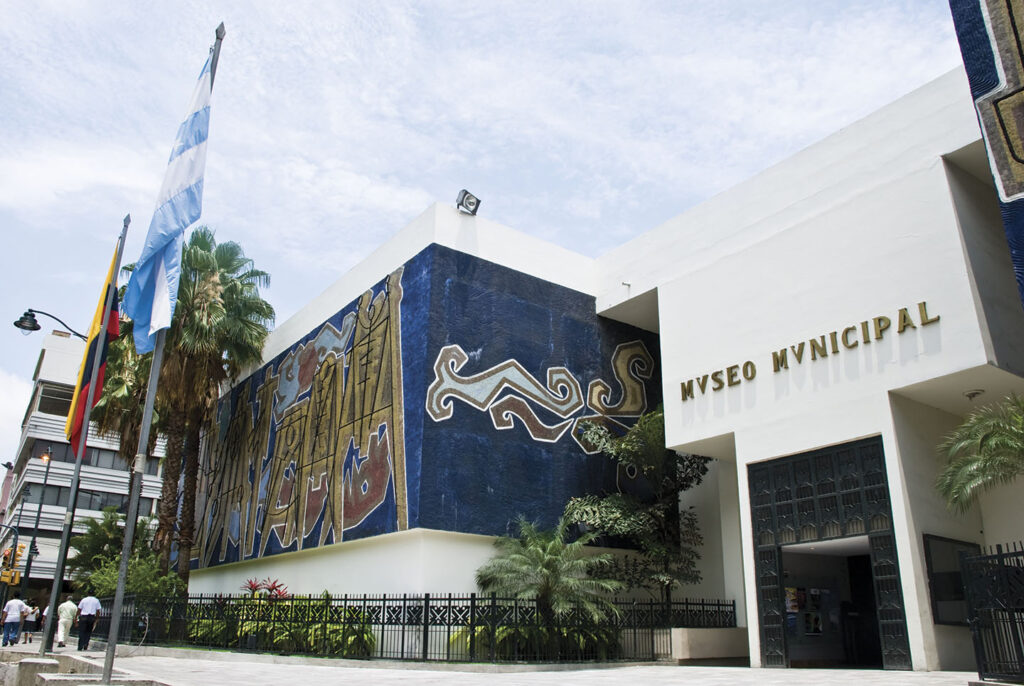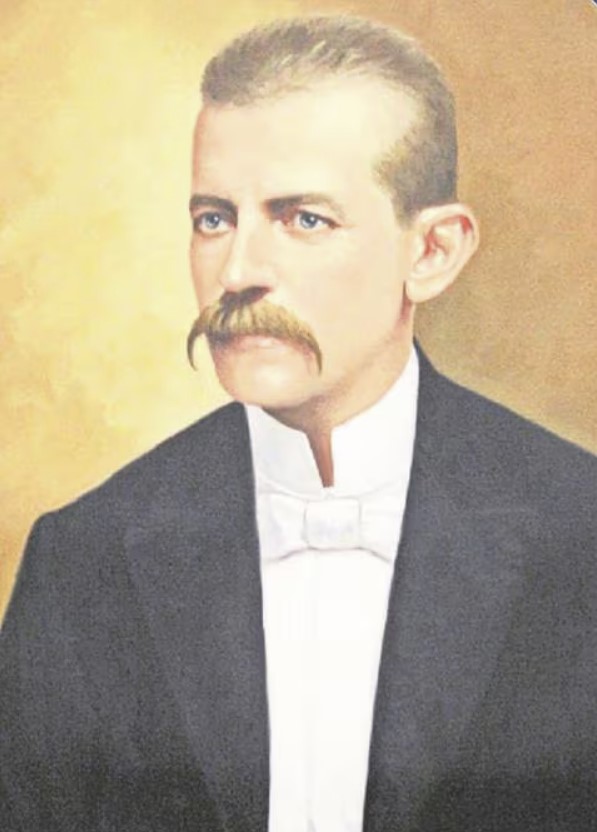Camilo Destruge Illingworth (Guayaquil, October 20, 1863 – Guayaquil, February 26, 1929) was an Ecuadorian historian, journalist, and chronicler. He served as the first director of the Museo Municipal de Guayaquil, where he helped preserve the city’s historical artifacts, and he also directed the Municipal Library for many years. Destruge authored numerous historical works, including La Entrevista de Bolívar y San Martín (1918) and the five-volume Álbum Biográfico Ecuatoriano (1903–1905). He contributed to and edited various newspapers, such as El Telégrafo and La Nación. A member of the National Academy of History, he was also honored by the Venezuelan government with the Orden del Libertador. Declared “Cronista Emérito de la Ciudad” (Honorary Chronicler of the City), Destruge’s legacy is commemorated through a historical institution, a school, and a street named after him in Guayaquil.
Early Life and Education
Camilo Destruge Illingworth was born on October 20, 1863, in Guayaquil, Ecuador. He was the son of Dr. Alcides Destruge Maitin, a Venezuelan doctor, journalist, and diplomat, and Carmen Illingworth Decimavilla, a native of Guayaquil. His father was a prominent figure, serving as a contributor to various Ecuadorian newspapers and holding the role of Venezuelan Consul General in Guayaquil.
Destruge began his education at the Colegio San Luis Gonzaga, run by the Hermanos Cristianos, and later attended Colegio San Vicente del Guayas (now the Vicente Rocafuerte National School), where he graduated with a high school diploma in 1881. His intellectual upbringing, influenced by his father’s extensive literary and diplomatic career, enabled him to become fluent in both French and English. Destruge was also active in civic life, volunteering as a firefighter in his youth.
Personal Life
In 1888, Destruge married Mercedes Lucero Barbotean, with whom he had a large family of seven daughters and three sons. He was fluent in French and English, skills taught to him by his father, and also played the piano. In 1890, while volunteering as a firefighter in Guayaquil, he was injured during a fire at a fabric store called “La Torre de Eiffel,” resulting in a severe burn to his leg and leaving him with a permanent limp. Despite this, he continued his work tirelessly. His wife was a constant source of support, often encouraging him to rest as he worked late into the night on his historical research. Later in life, some of his daughters assisted him by helping to organize and type his notes.
Military and Political Involvement
Destruge was deeply involved in Ecuador’s political landscape during his early years. In 1882, he enlisted in Eloy Alfaro’s army and participated in the pivotal 1883 takeover of Guayaquil, which led to the fall of General Ignacio de Veintemilla’s dictatorship. His involvement in the liberal movement continued throughout his life. In 1884, he joined the editorial team of the liberal newspaper El Telégrafo, where he contributed to its staunch opposition to the conservative government of President José María Plácido Caamaño. After El Telégrafo faced government crackdowns, including the exile of its editor Juan Murillo, Destruge himself went into hiding. He also participated in the failed “Revolución de los Chapulos” in 1884, and later continued contributing to other liberal newspapers such as El Globo and Los Andes. Throughout his career, Destruge remained a vocal advocate of liberalism, often risking personal safety to support these ideals.
Literary Career
Camilo Destruge’s most enduring legacy is his work as a historian, journalist, and writer. A tireless researcher, Destruge authored numerous works focusing on Ecuadorian history and South American independence. His first significant work, La Carta del Gran Capitán (1895), was followed by other influential publications, including Ecuador y el Perú en su cuestión de Límites (1899) and El Envenenamiento del Arzobispo Checa (1906). His magnum opus, the five-volume Álbum Biográfico Ecuatoriano (1903–1905), remains a key resource in Ecuadorian historical literature.
Destruge’s career in journalism was equally impactful. He founded and contributed to various publications, such as the satirical La Gallina Ciega and El Propagandista. Writing under pseudonyms such as “Camilo Desmoulins” and “Maclio,” Destruge became well-known for his sharp criticism of political figures and government actions, using his columns to voice support for the liberal cause.
Contributions to Ecuadorian Culture
In 1908, Camilo Destruge was appointed the first director of the Museo Municipal de Guayaquil (originally conceptualized as an industrial museum in 1863 by Pedro Carbo Noboa). He held this position for 17 years, during which time he oversaw the development and organization of the museum’s collections, making significant contributions to the preservation of Ecuador’s historical artifacts. His work extended to the Municipal Library, which he also directed from 1908 to 1925. Under his leadership, both institutions grew into central pillars of Guayaquil’s cultural and intellectual landscape.
Recognitions and Accolades
Throughout his life, Destruge earned numerous national and international recognitions for his work. He was a member of several historical academies, including those in Caracas, Madrid, Cartagena, and Rio de Janeiro. His contributions to Ecuadorian history were also acknowledged by the Venezuelan government, which awarded him the prestigious Orden del Libertador.
Camilo Destruge’s meticulous documentation of Ecuador’s history, particularly its independence struggles, and his leadership in preserving the country’s cultural heritage, have cemented his place as a central figure in Ecuadorian historiography. His tireless dedication to the pursuit of knowledge and historical preservation has left an indelible mark on the cultural fabric of Ecuador.
Later Years and Legacy
In 1925, at the age of 62, Destruge retired as Director of the Municipal Library and Museum due to declining health. The Municipality of Guayaquil honored him with the title of “Cronista Emérito de la Ciudad” and granted him a pension in recognition of his lifelong contributions to the city. Even in retirement, Destruge continued to write and research until his death.
Camilo Destruge passed away on February 26, 1929, following a stroke. His death marked the loss of one of Ecuador’s most prolific historians. Streets, schools, and institutions in Ecuador continue to bear his name, and his vast body of work remains an essential resource for understanding the history of Ecuador and its role in the broader South American independence movements. He is buried in the Guayaquil General Cemetery.
Municipal Museum of Guayaquil

Works
- La Carta del Gran Capitán (1895).
- El Ecuador y el Perú en su cuestión de Límites (1899), read it for free here.
- Para la Historia, una sentencia del Tribunal de Cuentas de Guayaquil (1901).
- Álbum biográfico ecuatoriano (1903).
- El Ecuador. La Expedición de Flores- Proyectos de Monarquía americana. 1.846-47 (1906).
- Cuestiones históricas. El envenenamiento del Arzobispo Checa, estudio documentado (1906), read it for free here.
- Ecuador: estudios, relaciones y apuntes históricos (1907), read it for free here.
- Discursos de Dn. José Mejía en las Cortes españolas de 1.810-13. con un Prólogo Histórico (1909).
- Ecuador. Controversia histórica sobre la iniciativa de la Independencia americana. (1909).
- La Gran defensa de Guayaquil (1911).
- Historia del Cuerpo de Bomberos de Guayaquil (1913).
- Biografía del General Juan Illingworth (1913).
- Prontuario de Historia del Ecuador (1915).
- Compendio para las Escuelas y colegios de la República (1915).
- Diccionario Biográfico Escolar (1916), read it for free here.
- Cuestión Histórica- Entrevista de Bolívar y San Martín (1918).
- La Columna de Octubre, relación histórica del homenaje de Guayaquil a los próceres de la Independencia (1918).
- Historia de la Revolución de Octubre (1920), read it for free here.
- Biografía del General León de Febres-Cordero (1920).
- Guayaquil en la Campaña Libertadora del Perú (1924).
- Historia de la Prensa de Guayaquil (1924).
- Homenaje del I. Concejo Cantonal a Vicente Rocafuerte, con documentos (1925).
- Ecuador-Perú. Dos centenarios. Combate de Malpelo. Agresión a Guayaquil. La defensa de la ciudad. Relaciones Históricas (1928), read it for free here.
- Compendio de la Historia del Ecuador.
References
- Wikipedia contributors. “Camilo Destruge.” Wikipedia, The Free Encyclopedia. Retrieved on September 26, 2024.
- Diccionario Biográfico Ecuador. “Camilo Destruge Illingworth.” Archived from the original at: Retrieved on September 26, 2024.
- Enciclopedia del Ecuador. “Camilo Destruge.” Retrieved on September 26, 2024.
- Find A Grave. “Camilo Destruge.” Retrieved on September 26, 2024.
- Wikipedia contributors. “Guayaquil Municipal Museum.” Wikipedia, The Free Encyclopedia. Retrieved on September 26, 2024.

